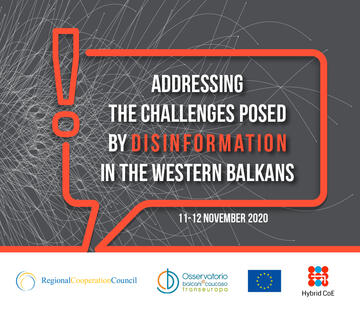More than 100 participants, representatives of regional organisations, governmental institutions and media have gathered for a two-day online conference on 11-12 November 2020 co-organised jointly by the Regional Cooperation Council (RCC), Osservatorio Balcani Caucaso Transeuropa (OBCT), the European Center of Excellence for Countering Hybrid Threats (Hybrid CoE) and the European External Action Service (EEAS) in order to discuss challenges posed by disinformation in the Western Balkans.
The event has served as an occasion for discussing the impact of disinformation from different angles, involving experts, practitioners and regulators. As highlighted by speakers, disinformation can be related to external interference and hybrid threats, as information operations have been used to delegitimise democratic processes or to steer the public conversation around certain topics. Finding adequate responses to minimise the impact of disinformation should be part of a comprehensive security strategy.
In this final statement , the participants give some fundamental recommendations to tackle disinformation in the region.
Tags: Fake news and disinformation
This content is part of the Media Freedom Rapid Response (MFRR), a Europe-wide mechanism which tracks, monitors and responds to violations of press and media freedom in EU Member States and Candidate Countries. The project is co-funded by the European Commission.



